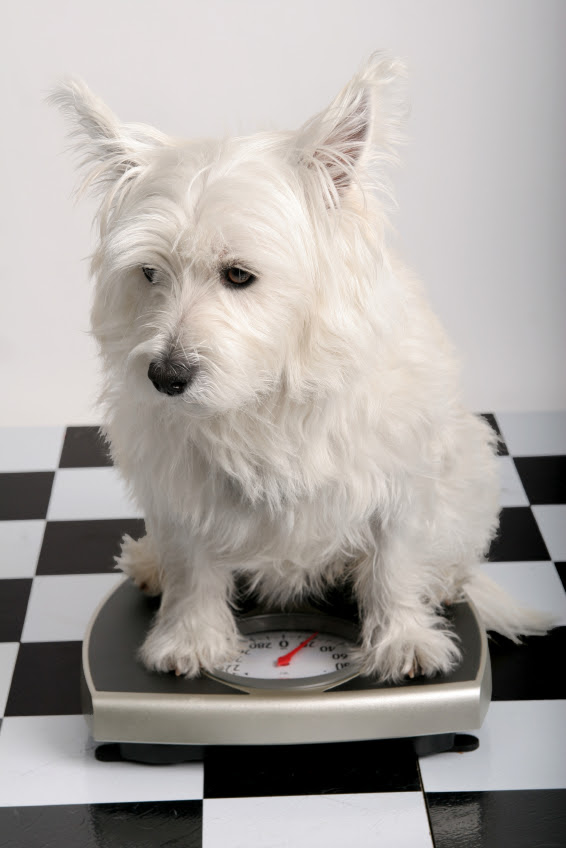By Dr. Bill Ormston, DVM
Overweight dog? It may be what you are
feeding rather than how much…

Feeding your dog is a necessity, not an optional part of owning a dog. Dogs that gain weight easily when fed high carbohydrate rations have lowered metabolisms compared with normal dogs. This predisposes the animal to other illnesses.
What is metabolism?
This is the chemical process that every cell in the body undergoes every day in order to survive. The main goal of this process is to reproduce DNA. In the process of reproducing DNA, the cell also produces energy, and uses energy, to function. While producing DNA it translates into protein, and makes heat in the process. With a lowered metabolism, the cells don’t produce normal DNA strands that they were meant to produce. This lowered metabolism results in a lowered body temperature. Normal dog body temperature is 100 to 101 .5 degrees Fahrenheit. Any temperature lower than normal is diagnostic for metabolic disorders.
What Makes My Dog Gain Weight?
What makes your dog gain weight if you aren’t overfeeding? The weight gain is primarily water. This water weight is often called inflammation, because any time there is an accumulation of fluid in the body, we recognize it as inflammation. Overweight dogs have inflammation in and around every cell of their bodies. Inflammations can also cause increased body temperature, however this overall bloat doesn’t usually cause this. Trans fatty acids also attract water to the cell. The cell wall is made up of fatty acids, however, trans fatty acids are not what they need. When the cell wall is made up of trans fatty acids, the cell wall doesn’t work well…and then the processing of DNA doesn’t work well. Instead of producing more cells, the cells are getting bigger.
Feeding For A Healthy Life
So, what you feed your dog is important in order to keep its metabolic rate at a normal level. You’ll know this when your dog has a normal range temperature and has not accumulated fatty pockets such as those over the tail head, waist, neck, and along the ribs. Feeding a high carbohydrate diet, along with exposure to many environmental elements that slow the metabolism are two causes of bloating (water weight gain) associated with dogs that get fat when fed normal amounts of food.
How to Solve the Problem
How do you correct this? By feeding a ration that is higher in omega 3 fatty acids and that has safe, higher protein levels that are not often found in typical dog rations. Protein is harder to digest; therefore it raises the metabolic rate by burning calories while the food is being digested. The proper omega fatty acid ratio helps to build cell walls that function better, resulting in more normal DNA being produced. The proper protein sources also result in better DNA production by providing more energy in the form of heat, thus allowing for the normal body temperature to be expressed.
If the dog is producing normal DNA, then metabolic disease is less likely to occur. It is less likely to harbor bacteria. All this results in a happier, healthier companion.
Source
Dr. Ormston, the eldest son of teachers from Marshalltown, Iowa, graduated from Iowa State University College of Veterinary Medicine in 1988 with his DVM and was the youngest recipient of the Gentle Doctor Award given by that college. He started out with private practices in Hays, Kansas and in Climax Springs, MO before moving to Celina, TX. In 1998 he attended Options for Animals and earned his certificate in Animal Chiropractic. Following his move to Texas he found himself in need of continuing education for the American Veterinary Chiropractic Association and sponsored a conference in Dallas, TX at Parker Chiropractic College. Soon after this endeavor he founded the Animal Chiropractic Program at Parker Chiropractic College with the sponsorship of the continuing education department.











